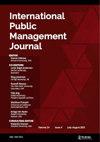Organizational forms of corruption networks: the Odebrecht-Toledo case
IF 3
3区 管理学
Q2 PUBLIC ADMINISTRATION
引用次数: 0
Abstract
AbstractActors in grand corruption schemes often conspire and deliberately create sophisticated networks to extract huge amounts of public resources from government systems. They hide such conspiracies behind hybrid formal/informal arrangements. Using a mixed methods approach, this study investigates the corruption scheme initiated by former Peruvian President Alejandro Toledo and the Brazilian construction giant Odebrecht Group. We argue that separating the networks of the client (Odebrecht) and the agent (Toledo) sides provides analytical leverage for studying complex corrupt arrangements. We found that the organizational forms designed by corrupt actors on either side were essential to ensuring the secret and safe operation of the network. Introducing the concept of organizational form into corruption research helps better understand the nature of these networks. We also found that different parts of the networks are shaped by different types of corruption. The article concludes with implications for practice. AcknowledgmentsThe authors would like to thank Jonathan Wexler for his valuable comments and suggestions.Disclosure statementOn behalf of all authors, the corresponding author states that there are no conflicts of interest.Additional informationNotes on contributorsDavid JancsicsDavid Jancsics is an Associate Professor in the School of Public Affairs at San Diego State University. His research agenda focuses on social and organizational aspects of corruption and informal practices.Jacopo CostaJacopo Costa is Senior Research Fellow at the Basel Institute on Governance. His research interests address topics in informal networks, illegal wildlife trade and the nexus between corruption and money laundering.腐败网络的组织形式:Odebrecht-Toledo案
大型腐败计划的参与者经常合谋并故意建立复杂的网络,从政府系统中榨取大量公共资源。他们把这样的阴谋隐藏在正式/非正式的混合安排之后。本研究采用混合方法,调查秘鲁前总统亚历杭德罗·托莱多和巴西建筑巨头Odebrecht集团发起的腐败计划。我们认为,将委托人(Odebrecht)和代理人(Toledo)双方的网络分离,为研究复杂的腐败安排提供了分析杠杆。我们发现,双方腐败行为者设计的组织形式对于确保网络的秘密和安全运行至关重要。在腐败研究中引入组织形式的概念有助于更好地理解这些网络的本质。我们还发现,网络的不同部分受到不同类型腐败的影响。这篇文章总结了对实践的启示。作者感谢Jonathan Wexler提出的宝贵意见和建议。披露声明通讯作者代表所有作者声明不存在利益冲突。作者简介:david Jancsics是圣地亚哥州立大学公共事务学院的副教授。他的研究重点是腐败和非正式行为的社会和组织方面。Jacopo Costa,巴塞尔治理研究所高级研究员。他的研究兴趣涉及非正式网络、非法野生动物贸易以及腐败与洗钱之间的关系。
本文章由计算机程序翻译,如有差异,请以英文原文为准。
求助全文
约1分钟内获得全文
求助全文
来源期刊

International Public Management Journal
PUBLIC ADMINISTRATION-
CiteScore
5.30
自引率
11.50%
发文量
49
期刊介绍:
The International Public Management Journal (IPMJ) publishes high-quality empirical and theoretical work on managing large organizations, particularly public organizations. IPMJ features work from scholars around the world who conduct research in the areas of public management and government reform, comparative public administration, organizational theory, and organizational behavior. IPMJ seeks to provide a bridge between those conducting research on public management and public administration on the one hand, and those working in the areas of organizational behavior and organization theory on the other. IPMJ intends to stimulate and reflect the academic interests of an international constituency of readers and scholars.
 求助内容:
求助内容: 应助结果提醒方式:
应助结果提醒方式:


